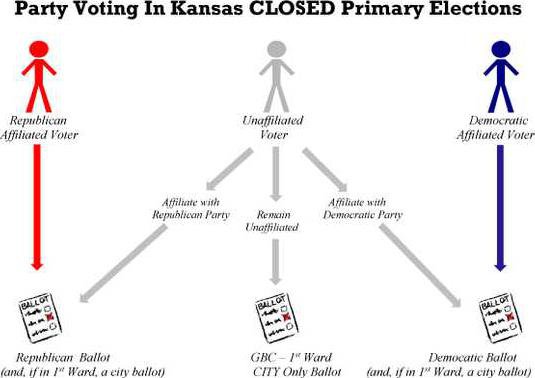Hold on Barton County voters, the upcoming Aug. 7 primary is going to be interesting.
“This our first combined partisan/non-partisan election,” said Barton County Election Officer Donna Zimmerman. “It could be confusing.”
Zimmerman wants to inform voters what this change means. So, she outlined the guidelines for the balloting.
At the heart of the confusion is the Great Bend City First City Council Ward. It will be the only non-partisan election appearing on the August Primary.
Until recent state legislation, such non-partisan races were not included in a primary. But, now in cities that have council districts (or wards), if there are more than three candidates, there must be a primary.
That was the case in Great Bend’s Ward 1. The two top vote-getters will then move to the general election Nov. 6.
In the case where a city elects council members at-large, if there are three times more candidates than there are open seats, then there will be a primary. There can be only two times more candidates than seats on the general election.
Anyway, for this primary, the at-large matter is not a factor. But it does mean there will be three different ballots, Zimmerman said.
They will include:
• The Republican ballot. GOP voters can vote in their partisan primary races and, if they live in Great Bend Ward 1, vote in the city council race.
• The Democratic ballot. Democratic voters can vote in their partisan primary and, as above, if they live in Great Bend Ward 1, vote in the city council race.
• Strictly a City of Great Bend ballot. This will be for only Ward 1 and is for unaffiliated voters who opt not to affiliate with a party and for third party voters (Libertarians).
This is the only race in which these voters can cast their ballots.
However, Zimmerman said voters can, as they come to vote, decide to affiliate with either the Republican or Democratic party and receive the appropriate ballot.
So, Zimmerman prepared this primmer on how to vote in primary elections:
The Republican and
Democratic party
primaries
Major political parties
• A person affiliated with the Republican Party may only vote a Republican ballot.
• A person affiliated with the Democratic Party may only vote a Democratic ballot.
Minor political parties
• A person affiliated with the Libertarian Party is not eligible to vote in the primary election.
EXCEPTION:
Voters residing in Great Bend City First Ward may vote the non-partisan city ballot.
Not Affiliated - chooses to affiliate
• A person registered to vote but not affiliated with any political party may choose to affiliate with the Republican Party and vote a Republican ballot.
• A person registered to vote but not affiliated with any political party may choose to affiliate with the Democratic Party and vote a Democratic ballot.
Not Affiliated – Does NOT choose to affiliate
• A person registered to vote but not affiliated with any political party and who does NOT choose to affiliate, may not vote in the primary election.
EXCEPTION:
Voters residing in Great Bend City First Ward may vote the non-partisan city ballot.
Other information
• Precinct committeemen and committeewomen are “elected” in the August primary and do not advance to the November general election.
• All other candidates nominated in the primary will appear together on the November general ballot.
For more information, contact Zimmerman at 620-793-1835.








